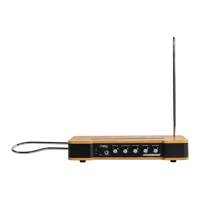26
CONTROLLING MOOG SYNTHESIZERS (Continued)
EXAMPLES OF USING VOLTAGE CONTROL
Here are just a couple of examples of how you can use Etherwave Theremin to enhance or modify
other instruments. The gestural control used when playing Etherwave Theremin can enrich nearly
any synthesizer session. The possibilities are limited only by your imagination—and, of course, the
specifications of each output and input. Explore and seek out new ways to integrate Etherwave
Theremin into your rig and into your performance.
CAUTION: Be sure you understand the operating levels of the equipment involved before making connections.
PLAYING SUBSEQUENT 25
This example allows you to explore playing a powerful, dynamic synthesizer using the same types of
gestures and controls used to play Etherwave Theremin. First, choose a meaty, sustaining preset on the
Subsequent 25. Try a sound voiced in the 16’ range.
Now, make your connections:
1. Connect the Etherwave Theremin PITCH CV OUT jack to the PITCH CV input jack on Subsequent 25.
2. Connect the Etherwave Theremin VOLUME CV OUT jack to the VOL CV input jack on Subsequent 25.
3. Connect the Etherwave Theremin GATE OUT jack to the KB GATE input jack on Subsequent 25.
NOTE: The CV and Gate output jacks of Etherwave Theremin are 3.5mm (1/8”) while the CV and Gate input jacks
of Subsequent 25 are 1/4”, so adapter cables will be needed.
As you move your left hand away from the Volume Antenna, you should hear Subsequent 25 begin
to sound. Move your right hand closer to the Pitch Antenna and hear the Subsequent 25 pitch rise.
As you get a little more familiar with controlling Subsequent 25 from Etherwave Theremin, be sure to
experiment with other presets as well.
MODIFYING A DFAM PERFORMANCE
This example allows you to use Etherwave Theremin to modify the pattern being played by DFAM
(Drummer From Another Mother). In this case, moving your hand near the Pitch Antenna will modify
the pitch played at each step, and moving your hand near the Volume Antenna will modify the
dynamics of the sequence. Note that in this example, there is no need to connect the GATE OUT
from Etherwave Theremin, as the DFAM sequencer is gating each step of the pattern.
Set up DFAM so that it is playing a rich, steady pattern, with a relatively low starting pitch (DFAM’s
included “Electro Thump” patch sheet works great).
Pause the playback and make your connections:
1. Connect the Etherwave Theremin PITCH CV OUT jack to the VCO 1 CV input jack on DFAM.
2. Connect the Etherwave Theremin VOLUME CV OUT jack to the VELOCITY input jack on DFAM.
Start the DFAM sequencer. As it continues to play, use the Etherwave Theremin to manipulate the
playback as you perform. Use your right hand near the Pitch Antenna to modify the pitch; use your
left hand near the Volume Antenna to modify the percussiveness of the playback.
TIP: Explore this setup further by connecting to other CV inputs such as Tempo, VCA Decay, VCF Mod, etc.

